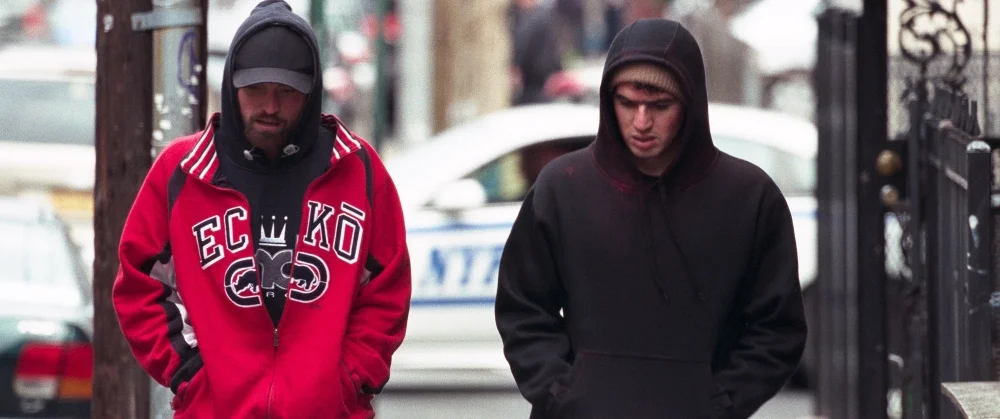Movie Review: “Ingrid Goes West,” with Aubrey Plaza, Elizabeth Olsen, O’Shea Jackson Jr., Wyatt Russell, and Billy Magnussen
The fascinatingly talented Aubrey Plaza gets a movie fully worthy of her myriad talents in Ingrid Goes West, a razor-sharp satire of influencer culture that pokes and prods at the validity and superficiality of online image cultivation without ever turning fully cruel. The comedy is deliciously dark, sometimes even bleak, but its performances are so pitch-perfect and its observations so insightfully nuanced that Ingrid Goes West will linger in your subconscious for a long time.
Plaza (of The Little Hours) is the titular Ingrid, a 20something just on either side of a nervous breakdown. When we meet her, she’s weeping in a car as she scrolls through social media posts of a woman’s wedding—in her bridesmaid dress and runny makeup, you would think Ingrid just got kicked out of a celebration to which she was rightfully invited. But it’s soon apparent that Ingrid isn’t really included in any social circles, doesn’t have any true friends, is isolated and secluded from the “real” world as she burrows further and deeper online, into Facebook and Twitter and Instagram feeds of people whose lives are defined by #nofilter hashtags and prayer hands emojis.
“I'm learning how to be present ... how to listen,” Ingrid says in a flatly self-motivational tone after the opening wedding sequence, but that’s obviously and clearly bullshit. It’s unclear whether Ingrid is even capable of self-growth—doesn’t that first require some sense of self? And Ingrid, who clutches her phone when she goes to sleep, who immediately turns it on when she gets up, who scrolls through Instagram while brushing her teeth, who watches videos on the toilet, doesn’t have much of that.
So after Ingrid’s mother dies (and Ingrid takes selfies while posing in her mother’s hospital bed), she cashes out her inheritance, shoves the $60,000 in a backpack, and hops on the road of self-actualization to California. It’s not that Ingrid wants to get away in a general sense—nope, she’s trying to get to Instagram celebrity Taylor Sloane (Elizabeth Olsen, of Captain America: Civil War) in a very real sense. After reading a magazine feature advertising Taylor as “your newest girl crush,” Ingrid becomes immediately obsessed with her—and thanks to the uber-connectedness of social media, is able to find out where she shops, where she lives, and practically everything she does.
Slowly but surely, Ingrid ingratiates herself into Taylor’s life until a sort of symbiotic friendship forms: Taylor gains an adoring clone in Ingrid; Ingrid gains someone to covet in Taylor. They chirpily tell each other they love each other and Taylor trusts Ingrid with a secret and Ingrid starts burning through her money to buy all the things Taylor (who considers herself a “photographer”) likes and recommends, even something as outlandish $1,300 lamp shade. Their dynamic, one of competition and codependence, feels simultaneously affectionate, urgent, and tainted, and of course it can’t last very long—not when Taylor’s life is revealed to be less than perfect, and not when Ingrid’s true motivations are unraveled.
It would be easy to mock these people—to poke fun at Ingrid’s desperate, selfish loneliness or Taylor’s carefully assembled, faux-aspirational lifestyle—but director Matt Spicer and his cowriter David Branson Smith don’t make things that easy for viewers. There must be some recognition and empathy from the audience for satire to really work, and Spicer and Smith understand that—they fill Ingrid Goes West with relatable moments and characters to ensure that your judgments aren’t immediate or unchangeable.
There’s an undeniably familiar quality to all of this: to blank-faced Ingrid shoving her face with fast food while using social media to absorb the interests and desires of others; to Taylor’s husband Ezra (Wyatt Russell, of 22 Jump Street) wearily explaining his “art” (garishly neon hashtags splashed on top of thrift-store paintings) to the nonplussed Ingrid; to Taylor posting photos of her avocado toast, her doughnuts, her desert wedding, and her whole goddamn life. For viewers of a certain age, this is the crap we do, even as we’re starved for something deeper—and Ingrid Goes West presents all the shortcomings of this lifestyle while still acknowledging its surface glamour.
The precision of Plaza and Olsen cannot be overstated. They’re so finely calibrated to their characters and to each other that they bring to mind other classic female-friendship films like Heathers, Clueless, and Mean Girls, movies that explore why and how women relate to each other in varyingly adoring and resentful ways. In his role as Ingrid’s neighbor and landlord, Dan, O’Shea Jackson Jr. is a delight in every scene, consistently adding a casual effortlessness that is counter to everyone else’s hyper-curated choices. And as Taylor’s brother Nicky, Billy Magnussen shines as a truly horrible example of nouveau-riche douchery, the kind of guy with cocaine muscles and a funemployed tan who can snuff out someone’s weakness nearly immediately and has no problem exploiting it. Seeing him and Plaza spar is almost overwhelmingly uncomfortable yet magnificently watchable.
There is so much actually crazy stuff that happens in Ingrid Goes West that would be unfair to spoil, but the movie is so confident in its pacing and its tone that even the most insane shit seems reasonable and understandable. “What’s your story?” Dan asks Ingrid, and in the pause Plaza takes before she replies is the whole essence of Ingrid Goes West: how we craft ourselves, how we want to presented, how we yearn to be perceived. It’s easier than ever now to manufacture your own identity—and Ingrid Goes West understands how essential destruction is to creation. The two go hand in hand, just like Ingrid and Taylor, at least for a little while.






